
Photos From These Anatomical Drawing Lectures In Thailand Went Viral
Wannarit's spellbinding drawing lessons combine art and medicine, leaving students and spectators speechless.

Drawing a human body is an art form that takes years to master because it's not just about shape and proportions but also properly presenting the intricate skeletal and muscle system that nature has provided us with. 650 skeletal muscles form our physique, and they need to be shown correctly.
Wannarit Karin, an artist from Thailand, is a master of these skills. He founded the ART of Anatomy academy, where he is passing his knowledge to future artists.
"I have been invited to be a lecturer for figure painting classes and have organized workshops for various organizations and companies," Wannarit Karin says on his website. His anatomical illustrations unravel the complicated parts of the human body, muscles, joints, ligaments, and many more.
Wannarit, an artist from Thailand, teaches anatomical and technical sketching classes that are amazing to watch
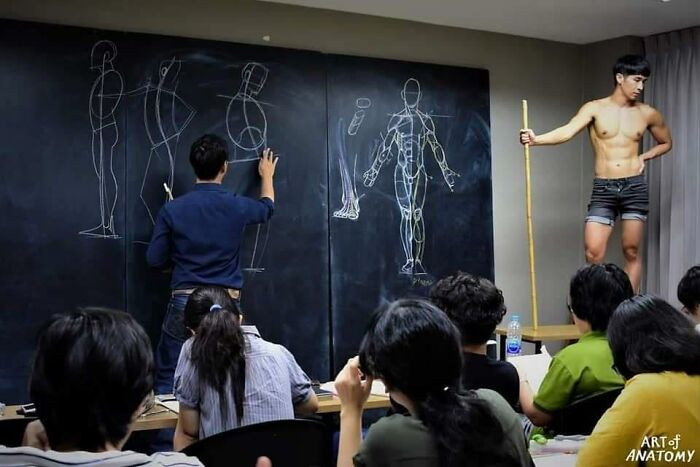 ArtOfAnatomy-Thailand.com
ArtOfAnatomy-Thailand.com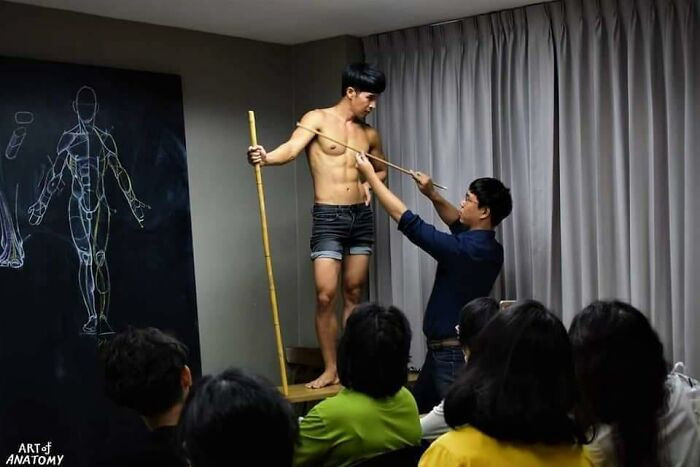 ArtOfAnatomy-Thailand.com
ArtOfAnatomy-Thailand.com
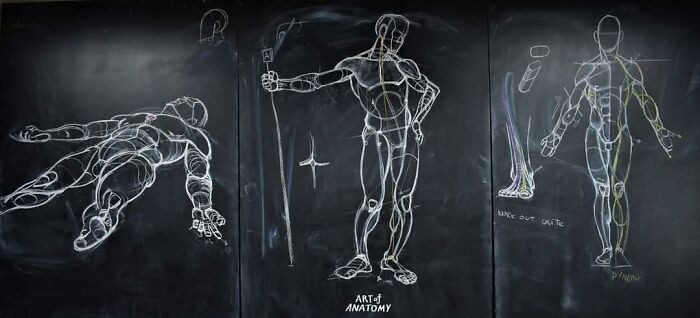 ArtOfAnatomy-Thailand.com
ArtOfAnatomy-Thailand.comWannarit Karin has been teaching classes on anatomical and technical sketching for more than ten years now. There are several different courses to match students of various skills.
The artist says that anatomical drawing was just a hobby at first. “I never thought a hobby could become a career because I was just an average art teacher.”
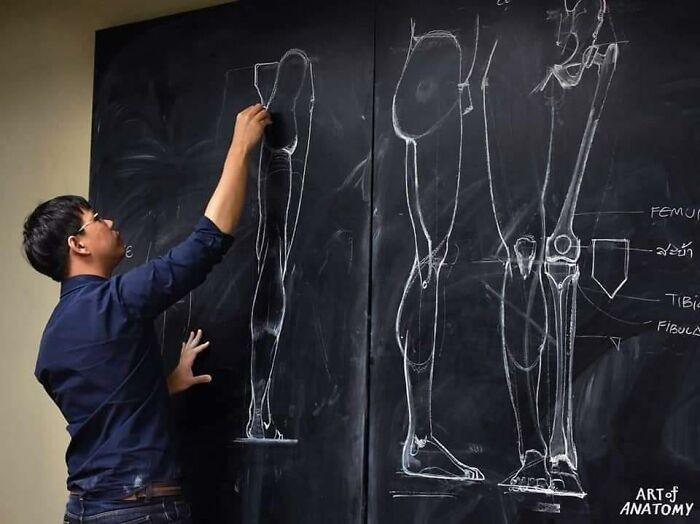 ArtOfAnatomy-Thailand.com
ArtOfAnatomy-Thailand.com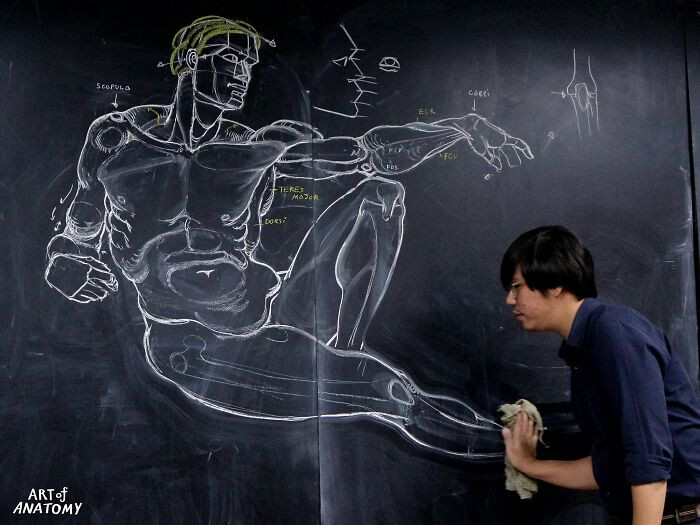 ArtOfAnatomy-Thailand.com
ArtOfAnatomy-Thailand.com
Wannarit educates his students to paint the real-life human body, indicating the muscles to illustrate on paper
 ArtOfAnatomy-Thailand.com
ArtOfAnatomy-Thailand.com“One day, I saw some of my students couldn’t draw parts of the human body, such as arms or legs, so I gave them a few basic pieces of advice, and it worked. They were surprised to discover that anatomical knowledge could help them draw people more realistically.”
Wannarit believed that Thai artists mostly knew human anatomy, but he was wrong. “That’s why I decided to open up a class that focuses specifically on human anatomy, and it turns out to be quite popular, even with only 4 classes a year.”
 ArtOfAnatomy-Thailand.com
ArtOfAnatomy-Thailand.com ArtOfAnatomy-Thailand.com
ArtOfAnatomy-Thailand.com
 ArtOfAnatomy-Thailand.com
ArtOfAnatomy-Thailand.comThe teacher says that he explored human anatomy for many years before he started lecturing. Wannarit highlighted that studying anatomy requires much memorization and repetitive drawing.
“I’ll admit that it’s challenging to do, so I just put up anatomy posters all over my house along with anatomy figures on my work desk, bedside table, and kitchen table. Doing these things allows me to see human anatomy all the time, so it becomes common knowledge.”
 ArtOfAnatomy-Thailand.com
ArtOfAnatomy-Thailand.comKnowledge about anatomy, precision, and technical skills are all combined in this class
 ArtOfAnatomy-Thailand.com
ArtOfAnatomy-Thailand.com
 ArtOfAnatomy-Thailand.com
ArtOfAnatomy-Thailand.comWannarit said that painters should always keep these images in their heads because “they really affect how you comprehend when you have to teach others how to draw parts of the body at a weird angle.”
Wannarit’s class named “anatomy for the artist” focuses on giving students a comprehensive knowledge of the human body and untangling complicated parts.
“Drawing the head” is another popular Wannarit’s class, and it involves doings drawing of a human face from a mannequin. It requires a deep understanding of the facial composition.
 ArtOfAnatomy-Thailand.com
ArtOfAnatomy-Thailand.com ArtOfAnatomy-Thailand.com
ArtOfAnatomy-Thailand.com
 ArtOfAnatomy-Thailand.com
ArtOfAnatomy-Thailand.com
Wannarit said that to portray humans realistically, you can’t get around human anatomy. “However, anatomy for artists is different from anatomy for doctors because artists have to modify nature to best fit their own style of work.”
“Correctness in terms of art is very subjective and individual, while for doctors, it really has to be specific with correct meanings.”
He had been teaching art classes for 10 years before he was asked by the University to be a lecturer for figure painting classes
 ArtOfAnatomy-Thailand.com
ArtOfAnatomy-Thailand.com
 ArtOfAnatomy-Thailand.com
ArtOfAnatomy-Thailand.com
 ArtOfAnatomy-Thailand.com
ArtOfAnatomy-Thailand.com
It took Wannarit a long time to realize that human anatomy for painters “is not only knowledge about muscles and bones, but most importantly, about how muscles are related to the overall form, because every part of our body is always in sync.”
Finally, if the artist can understand that, “it could enhance how they portray beauty and unify what Mother Nature has given us,” Wannarit concluded.
 ArtOfAnatomy-Thailand.com
ArtOfAnatomy-Thailand.com
 ArtOfAnatomy-Thailand.com
ArtOfAnatomy-Thailand.com
The anatomical drawing was a crucial part of classical painting, and many famous painters were masters of human body depictions. Da Vinci, Michelangelo, and Rembrandt used to research anatomy, watch public dissections, and publish their illustrations to earn money.
Wannarit also works as a freelance artist. He creates sketches, sculptures, and medical drawings
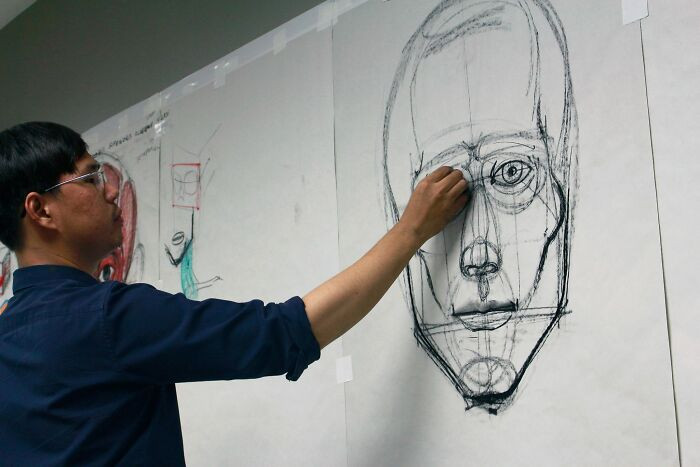 ArtOfAnatomy-Thailand.com
ArtOfAnatomy-Thailand.com
 ArtOfAnatomy-Thailand.com
ArtOfAnatomy-Thailand.com
 ArtOfAnatomy-Thailand.com
ArtOfAnatomy-Thailand.com
 ArtOfAnatomy-Thailand.com
ArtOfAnatomy-Thailand.com
 ArtOfAnatomy-Thailand.com
ArtOfAnatomy-Thailand.com
 ArtOfAnatomy-Thailand.com
ArtOfAnatomy-Thailand.com
 ArtOfAnatomy-Thailand.com
ArtOfAnatomy-Thailand.com
People are fascinated by Wannarit’s drawing skills:







Damjan







